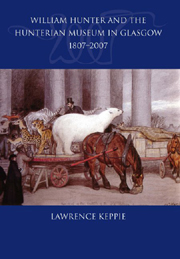Book contents
- Frontmatter
- Contents
- Foreword by Sir Kenneth Calman
- Introduction
- List of Illustrations
- Acknowledgements
- Abbreviations used in the Notes
- Dedication
- 1 William Hunter's Life and Career
- 2 Growth of the Hunterian Collection
- 3 ‘The Noblest Legacy upon Record’
- 4 A Temple of the Muses: the First Hunterian Museum in Glasgow
- 5 ‘This Place of Fascination’: the Impact of the Museum, 1807–70
- 6 A New Museum for a New University, 1870–1900
- 7 The Twentieth Century: War, Peace and Renewal, 1900–75
- 8 The Hunterian Art Gallery
- 9 Modern Times, 1975–2007
- 10 Overview: Meeting William Hunter's Intentions
- Postscript: Looking to the Future
- Notes
- Appendix: Catalogues of the Hunterian Collections
- Bibliography
- Index
- Plate section
Postscript: Looking to the Future
Published online by Cambridge University Press: 12 September 2012
- Frontmatter
- Contents
- Foreword by Sir Kenneth Calman
- Introduction
- List of Illustrations
- Acknowledgements
- Abbreviations used in the Notes
- Dedication
- 1 William Hunter's Life and Career
- 2 Growth of the Hunterian Collection
- 3 ‘The Noblest Legacy upon Record’
- 4 A Temple of the Muses: the First Hunterian Museum in Glasgow
- 5 ‘This Place of Fascination’: the Impact of the Museum, 1807–70
- 6 A New Museum for a New University, 1870–1900
- 7 The Twentieth Century: War, Peace and Renewal, 1900–75
- 8 The Hunterian Art Gallery
- 9 Modern Times, 1975–2007
- 10 Overview: Meeting William Hunter's Intentions
- Postscript: Looking to the Future
- Notes
- Appendix: Catalogues of the Hunterian Collections
- Bibliography
- Index
- Plate section
Summary
‘To acquire knowledge, and to communicate it to others, has been the pleasure, the business and the ambition of my life.’
Hunter's creed (above, p. 16) still strikes a chord for those working in the Hunterian today. Their vision for the twenty-first century is to maintain and develop the collections of the University of Glasgow as an outstanding resource for research, lifelong learning and enjoyment, accessible to all. That means serving the public of Glasgow and beyond, as well as the higher education community. The fundamental responsibility is to sustain and nurture, for future generations, the splendid internationally important collections created by the generosity and trust of academics and donors over 200 years. Beyond this it means adapting to the evolving aims of national cultural policy and the University's strategic objectives. It means engaging fully with students and worldwide users, and working with the city of Glasgow, other museums and cultural organisations. It implies near-national levels of resource and service quality to match the calibre of the collections. Glasgow Museums are well on the way to achieving this and the Hunterian must collaborate closely with them in developing a national strategy for cultural provision and a West Coast powerhouse of innovative, collections-related research and display. The Hunterian must focus on the special strengths of the collections and continue to encourage imaginative, fluid, unconventional thinking about how they can be made accessible and presented.
- Type
- Chapter
- Information
- William Hunter and the Hunterian Museum in Glasgow 1807–2007 , pp. 136 - 137Publisher: Edinburgh University PressPrint publication year: 2007



